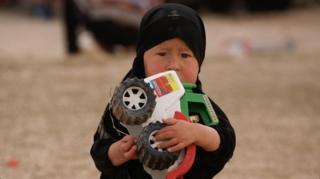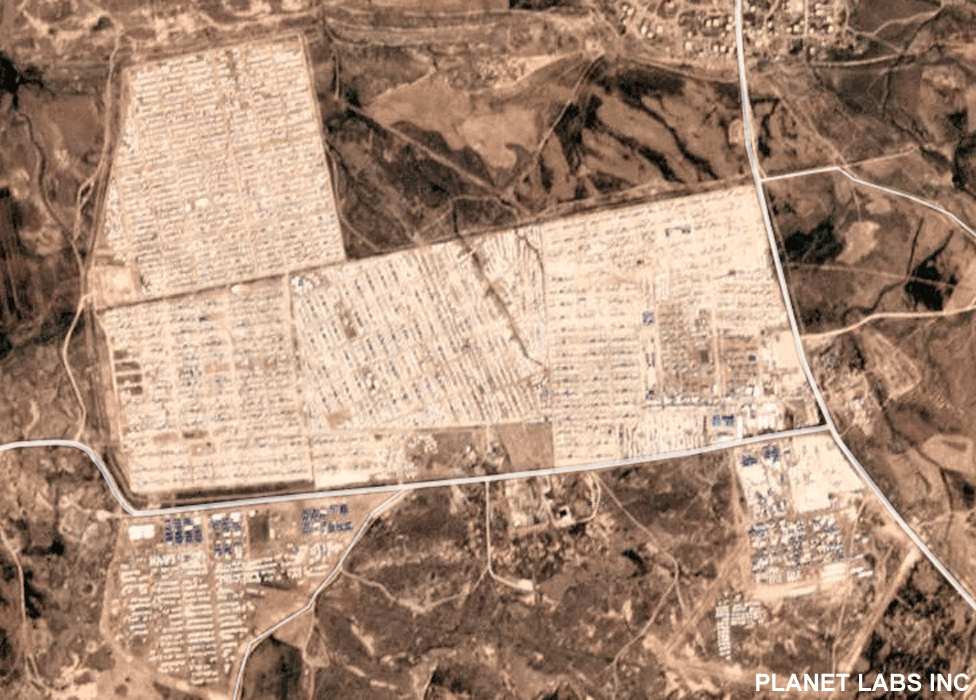Home » Middle East »
The women and children no-one wants
The al-Hol camp in north eastern Syria is an overflowing vessel of anger and unanswered questions. Inside are the lost women and children of the jihadist group Islamic State (IS), abandoned by their men, their nightmare caliphate and their governments.
Some cling to their hate-fuelled ideology: “We are undefeated!” they scream in your face. Others beg for a way out – a way home.
While western governments prevaricate, their children die.
Umm Usma, a Moroccan-Belgian woman, clings to a fantasy that she helped the women and children of Syria in her six years here, most of it with IS.
The former nurse grabs her niqab with a black-gloved hand, “This is my choice,” she says. “In Belgium I couldn’t wear my niqab – this is my choice.”
“Every religion did something wrong,” she said. “Show us the good.”
As she shouts with a group of other black-clad women, a badly burnt child is pushed in a buggy through the mud by his mother. “Look at what they did,” her mother shouts, referring to US-backed forces.
Al-Hol is a nightmare, a camp that has grown from 11,000 people, to more than 70,000. It is swollen with the dark aftermath of the collapsed pseudo-caliphate. It is ready to burst.
Umm Usma says she has no need to apologise for the 2016 IS attack in Brussels in which 32 people – not including the bombers – were killed. In her mind, an attack against her country by the group she joined doesn’t need to be answered. She has cloaked herself in victimhood. She believes the west and its air strikes against the last IS hold-out of Baghouz is to blame for their misery. The hate and violence perpetrated by IS is forgotten.
This is the jihadist mind-trick, a selective memory that erases any wrongdoing.
“I won’t talk about what my husband did, I don’t know what he did,” Umm Usma claims. She has lived under democracy and under IS. She tells me she knows which one is better. “Your mind is closed,” she says as she turns her back and walks away.
It is only two weeks since Baghouz, the last of IS-governed territory, fell to Kurdish-led forces. The Kurds had taken their time, allowing ceasefire after ceasefire so that women, children and the injured could leave. The coalition warplanes that killed civilians in Mosul and Raqqa, IS’s two lost capitals, were more cautious over Baghouz.
Infant victims
IS used their families as a last line of defence.
“In one day, at least 2,000 people were killed,” one Iraqi boy who survived the combat, tells me. “IS parked vehicles among the tents of families. We knew that vehicles were targeted, so we told them to take the vehicles away. But they didn’t, and the vehicles exploded.”
When the fighting was over, Baghouz was cleared of corpses before the media arrived.
The men of IS were not just soldiers on a battlefield. They brought with them women, children and extended families.
Nour is a victim of their catastrophe. She lies on an examination bed in the camp’s Red Crescent clinic. The six-year-old has been shot in the face. That was 15 days ago, and since then she’s only been given the barest of medical attention. Her cheeks are swollen and her teeth shattered. The pain appears to be something she’s become accustomed to, because she only screams when she’s moved.
It was a sniper’s round that came through the tent in Baghouz. She was hiding out there with her family, part of an army of hardcore believers who stayed with IS to the end.
In al-Hol, many of the war wounded are children. Nour’s mother, from Turkmenistan, is too sick to stand. She curls on her side, beside Nour, teetering on the edge of the bed. Her IS fighter husband is already dead.
Nour’s condition needs urgent attention and she is sent to a hospital in the city of Hassakeh. Now the clinic bed is emptied and a new occupant is placed on its black leather surface.
But Asma is barely there at all, she’s a faint speck of a human being, almost transparent. Too weak to cry much, she looks only days old. She is, in fact, six months old. Her sister, a girl herself, stands above her, eyes cast down. As IS fought to the last, their families starved.
Displaced caliphate
Some 169 children have died since escaping Baghouz. Children who did no wrong. Those that remain are at risk from sickness and disease. And there is a greater danger that western governments appear to have ignored. They are still in the care of extremist parents, and their malice isn’t being countered or re-educated, it is being left to fester.
Those that survived IS were brought to in open cattle trucks, across the desert in their tens of thousands to al-Hol. The village by the camp is where IS once sold Yazidi women as slaves, and not far from here hundreds of Kurdish-led forces were killed in a single IS attack. The two-storey school in the village still has the IS flag painted across it. The spring rains and summer sun are fading it to nothing.
The campsite is at the village edge: a mini-state, a displaced caliphate, a growing danger that is now larger than the village itself.
What remains inside, no-one wants. A few governments have taken people back: Russia, Saudi Arabia and Morocco. The United States has taken back a single woman. The UK has no plan to repatriate fighters or their families. Al-Hol is the camp where Shamima Begum, the teenager from London, was first held and where she learned she had been stripped of her British citizenship. France has taken back a handful of orphans whose parents died fighting for IS.
There are degrees or radicalisation and the immediate aftermath of a war is no place to judge who can be reformed, who can be saved.
Interactive
See how the camp has grown since December 2018
18 March 2019
11 December 2018
Toxic ideology
The foreign women in the camp are kept separately, under armed guard. Here the ideology is at its most toxic, this is where the true believers are contained. A guard outside points to his bruised head. “They threw rocks at us yesterday,” he says.
By the entrance, a bag of raw chicken pieces lies tied up in the dirt. Women are pressed up against the chain-link fence, demanding to be let out. They are from everywhere: Brazil, Germany, France, Morocco, Somalia, the list goes on.
The western women are wary of speaking inside. They fear being attacked by the more radical women in the camp, if they are seen speaking to a man. If they remove their veils, they are set upon by some of the women. Tents have been burned to the ground in retribution.
“The Tunisian and Russian women are the worst,” says 19-year-old Leonora Messing from Germany. She points to two large communal tents. “They were last to come out from Baghouz.”
Messing joined IS at the age of 15, a month after another 15-year-old, Shamima Begum, and her friends fled Britain for Syria. Begum became the third wife to a German extremist who is now, too, in Kurdish custody.
The German woman is full of regret, born not only of circumstance, but regret, she says, that long predates the defeat of IS.
“I was a half-year in Isis and I asked my father if he can help me to send a smuggler to bring me out. They sent a smuggler but security from Isis, they killed him. And then they catch me also because they find pictures of me on his phone. And then I was locked up first time in prison [in Raqqa] and then a second time in [the village of] Shaafa,” she explains.
In her arms, she cradles a two-month-old, wrinkle-faced baby, her second child, born in Baghouz as the fighting raged all around them.
“I gave birth alone. There was no doctors, no nurses”, she says, “I sent my husband out. I sent him. I was crying. You know how woman have faith. I said you search. He said there is nobody. I said GO SEARCH.”
She still loves her extremist husband and says she will wait for him if he is sent back to Germany to serve a prison sentence.
She talks about the death of Shamima Begum’s son, who was born in the camp, and died just 20 days later. Both of her own children have been sick, but she says she has reason to believe they will be safe.
Our second meeting is cut short. Leonora Messing has an appointment. A convoy of armoured-vehicles, protected by armed men arrives with westerners inside. “The German government wants to check on my children,” Messing said.
How much mercy?
Britain’s foreign secretary has said it is too dangerous for UK diplomats to travel to Syria, a place where, like Germany, it has no consulates or embassies. There is still no plan to repatriate women and children, many of whose husbands have been killed or stripped of their UK citizenship.
As rain clouds swirl and thicken above, two gangly young women march across the muddy ground with purpose heading straight for me and my Syrian colleague. The camp smells bad, there isn’t proper sanitation and the rain isn’t helping. One of the pair is carrying, incongruously, a patent leather handbag, with a little diamante clasp. Through their veils I see what looks like the eyes of teenage girls.
“Where are our husbands? When will they be released?” they demand, but without much menace. When my colleague shrugs his shoulders, one of the women says, “ask him,” pointing at me with a black gloved hand. A giggle emerges from under the other black dresses.
They may have their answers in the coming days, as Iraq too, prepares to take back its people. The high value prisoners will go first and will almost certainly be executed, and their women and children will follow to Iraq. Camps are already being prepared, not very far from al-Hol, on the Iraqi side of the border.
That will alleviate pressure at the camp, but it will not solve the enduring question that al-Hol presents the West. How much mercy should be shown to an enemy that offered none, what is to become of their women and children now that the IS is gone?
Source: Read Full Article




